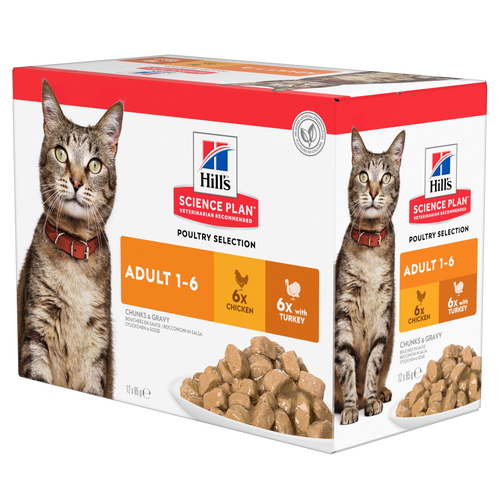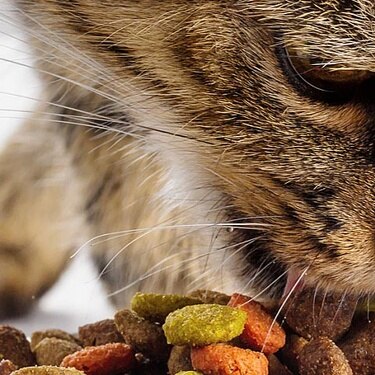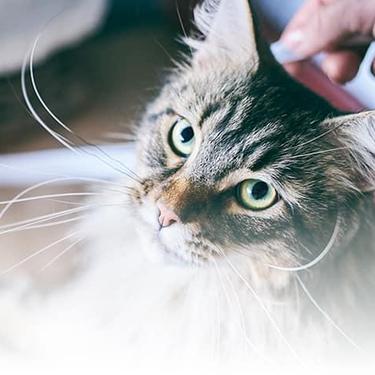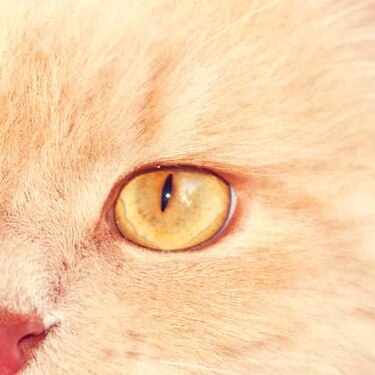
-
Find the right food for your petTake this quiz to see which food may be the best for your furry friend.Find the right food for your petTake this quiz to see which food may be the best for your furry friend.Featured products
 Mature Adult Dog Food
Mature Adult Dog FoodHill's Science Plan Mature Adult Multipack Wet Dog Food with Chicken & Beef are complete premium pet foods for mature adult dogs from 7 years. Your dog will love these deliciously smooth and savoury minced loaves, formulated to deliver the appropriate amount of energy to support the needs of adult dogs.
Shop Now Adult Wet Dog Food with Beef
Adult Wet Dog Food with BeefHill's Science Plan Adult Multipack Wet Dog Food with Chicken, Beef & Turkey are complete premium pet foods for adult dogs from 1 year. Your dog will love these deliciously smooth and savoury minced loaves, formulated for balanced nutrition and overall health.
Shop Now Puppy Food
Puppy FoodHill's Science Plan Puppy Multipack Wet Dog Food with Chicken & Beef are complete premium pet foods for growing puppies from weaning until 1 year old and for pregnant and nursing dogs. Your puppy will love these deliciously smooth and savoury minced loaves, formulated for balanced nutrition and overall health.
Shop NowFeatured products Light Adult Multipack Wet Cat Food with Chicken & Ocean Fish
Light Adult Multipack Wet Cat Food with Chicken & Ocean FishTender chicken chunks in gravy for cats, with L-carnitine and fewer calories for ideal weight management. Packed with high-quality protein, omega-6s, and vitamin E for shiny fur and healthy skin.
Shop Now Mature Adult Wet Cat Food with Chicken
Mature Adult Wet Cat Food with Chicken
Tender chicken chunks in gravy for mature adult cats. Made with easy-to-digest ingredients, high-quality protein for lean muscle maintenance and antioxidant vitamins C+E for optimal health.
Shop Now Adult Multipack Wet Cat Food with Beef, Ocean Fish & Chicken
Adult Multipack Wet Cat Food with Beef, Ocean Fish & ChickenTender chunks in gravy for cats, with high-quality protein to maintain lean muscle. With vitamin E and omega-3s & -6s for healthy skin and balanced minerals to support healthy vital organs.
Shop Now -
Dog
- Dog Tips & Articles
-
Health Category
- Weight
- Food & Environmental Sensitivities
- Urinary
- Digestive
- Joint
- Kidney
-
Life Stage
- Puppy Nutrition
- Adult Nutrition
- Senior Nutrition
Cat- Cat Tips & Articles
-
Health Category
- Weight
- Skin & Food Sensitivities
- Urinary
- Digestive
- Kidney
-
Life Stage
- Kitten Nutrition
- Adult Nutrition
Featured articles The Right Diet For Your Pet
The Right Diet For Your PetIn people, the right diet is very important. If you are eating the wrong way for your metabolism, activity level, age and lifestyle you could end up with health issues.
Read More The Incredible Science Behind Your Pet's Microbiome
The Incredible Science Behind Your Pet's MicrobiomeLearn what your pet's microbiome is, how it contributes to your pet's gut and overall health, and why nutrition is important in maintaining healthy microbiomes.
Read More Show some love with wet foods: a great choice for pets with health issues
Show some love with wet foods: a great choice for pets with health issuesShow some love with wet foods: a great choice for pets with health issues.
Read More -


Does your cat suffer from occasional bouts of sudden onset diarrhoea or pain when they try to pass faeces? If so, your cat may be suffering from Irritable Bowel Syndrome, or IBS. This is sometimes confused with Inflammatory Bowel Disease (IBD), but they are not the same. IBS is usually triggered by stress in cats and causes acute signs, whereas IBD refers to a variety of problems that cause chronic inflammation of the bowel, or chronic enteropathies, as they are now called.
What causes IBS in cats and what are the signs?
IBS in cats is usually triggered by stressful events, such as visitors, a new cat, a new baby, or a trip to the cattery. Because the intestines are in turmoil, it can also be quite uncomfortable. You may notice your cat seems depressed or lethargic, or may seem to have pain when they try to go to the toilet. Your cat may also vomit. You might notice mucus or blood in their poo. They may be in and out of the litter tray much more than usual. If they go to the toilet outside, you might only notice that they are in and out much more than usual. They could also go off their food.


Tasty Tips
What is the treatment for IBS and what should you feed your cat with IBS?
Your vet may give your cat medication to settle any nausea and help the colicky pain and signs of IBS. It’s important that your cat keeps eating if possible because the gut heals much more quickly if feeding continues. The vet will likely want to put your cat on a gastrointestinal support diet so that they will be well-nourished even if they’re not eating as much as usual. These foods are highly digestible with high-quality ingredients, and often have nutrients such as omega 3 fatty acids to reduce inflammation. They will also have a good blend of prebiotic fibres to help nourish the microbiome and keep the gut healthy. Once the signs have settled, your cat may be able to return to their normal diet. Your vet will advise on the best course of action.
Fundamentally, dealing with the sources of stress is the best way to tackle IBS in cats. If it was a one-off thing, like some noisy visitors or a cattery visit, you may not have much to do. But if there is cat-to-cat conflict in the house, it may become a recurrent problem.
Cats may seem like the most laid-back, chilled creatures on earth, but actually cats can really suffer from stress without showing many obvious signs. They are predators, but they are also prey to larger animals, so are very vigilant to danger and love to have escape opportunities at all times. They live in three dimensions, so they seek out high places such as bookshelves and counter tops to feel secure.
Cats are, by nature, solitary animals. They can live together in some situations, but many cats find themselves sharing their house or garden with one or more cats they don’t like and this can be very stressful for them. Other cats are a threat to their precious resources - food, water, litter trays, and you! Indoor living is also a source of stress for lots of cats because of the frustration of not being allowed to explore.
The most common signs of stress are:
Excessive grooming and hair loss, especially on the stomach and around the hind limbs (always rule out fleas first!).
Urinary problems. Stress-related cystitis is a common problem in cats. You may notice your cat going to the litter tray but only passing a few drops at a time. Always see your vet if you think your cat might have this as it can be very serious.
Toileting in odd locations. If one of your cats is being bullied and not getting access to the garden or the litter tray, they may start going to the toilet in other areas of the house.
Relieving stress in the home
There are some relatively simple changes you can make at home to help your cat, especially if you have more than one cat:
Talk to your vet about diet in the longer term. There are some foods that have natural additives proven to reduce anxiety and help stressed cats. Wet food is always a good idea too (although not essential) because water intake is so important if there are also stress-related bladder issues.
Always have one more litter tray than you have cats. These should be in several locations round the house so there is always access.
The same goes for food and water bowls. Again, these should be in different places around the house. This may be inconvenient for you, but it is much better for your cats. This way all your cats can eat and drink, without needing to confront another cat.
Pheromone diffusers can be a big help. Ask your vet about these.
Look at your house and try to see places where your cats might have to cross paths. Providing shelves and furniture so one can ‘take the high road’ in narrow passageways can make all the difference.
As always, if you’re not sure what might be going on, talk to your vet. We are always happy to help and the sooner the better.
Reviewed by Dr. Hein Meyer, DVM, PhD, Dipl-ECVIM-CA


One of our staff authors prepared this article for you
Related products

Tender chicken chunks in gravy for mature adult cats. Made with easy-to-digest ingredients, high-quality protein for lean muscle maintenance and antioxidant vitamins C+E for optimal health.

Tender chunks in gravy for cats, with high-quality protein to maintain lean muscle. With vitamin E and omega-3s & -6s for healthy skin and balanced minerals to support healthy vital organs.

Tender chicken chunks in gravy for cats, with L-carnitine and fewer calories for ideal weight management. Packed with high-quality protein, omega-6s, and vitamin E for shiny fur and healthy skin.

Related articles

From essential vitamins & minerals to different types of meat, learn what to look for when choosing the best cat food for your feline.

Learn how to make homemade cat treats that are healthy for your pet with this recipe from Hills Pet Nutrition.

There are three common ways to feed a cat. Each way has its advantages and disadvantages.

Chocolate is known to be poisonous for dogs, but it can also be toxic for cats. Learn why chocolate is bad for cats & what to do if she's eaten it.

Put your cat on a diet without them knowing
Our low calorie formula helps you control your cat's weight. It's packed with high-quality protein for building lean muscles, and made with purposeful ingredients for a flavourful, nutritious meal. Clinically proven antioxidants, Vitamin C+E, help promote a healthy immune system.
Put your cat on a diet without them knowing
Our low calorie formula helps you control your cat's weight. It's packed with high-quality protein for building lean muscles, and made with purposeful ingredients for a flavourful, nutritious meal. Clinically proven antioxidants, Vitamin C+E, help promote a healthy immune system.

